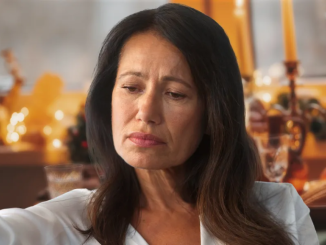The Game of Thrones actress, 36, looked positively radiant as she posted a fresh-faced snap on her Instagram, yet some people online criticized her for her aging face. Luckily, Emilia’s fans jumped into action to defend the stunning beauty, and they were quick to celebrate her all-natural look.

The actress shared an adorable selfie where she has minimal makeup on. The pic showed her grinning as she proudly held a mug her mom gifted her. But Emilia’s wholesome post soon gathered a number of negative comments.
One person wrote, “What’s happening with those hairs, they’re worse than mine right now.” While another added, “Big forehead and looks 50 years old now.” A third person continued to criticize Clarke for her all-natural features, and commented that she “hit a wall.”

In response, the actress’s fans rushed to shower her with compliments and defended her by saying, “It’s not cool to put someone down for aging!”
One fan wrote, “Thank you for laughing so much Emilia, you make the world brighter” and another commented, “This is by far the most beautiful woman in Hollywood.” Someone also gushed about Clarke’s stunning, all-natural features saying “Beautiful — actual smile lines in an IG pic.”

This is not the first time that the actress, who rose to fame at just 23 thanks to Game of Thrones, has received comments about her looks. In 2021, she recalled that, at only 28 years old, she was told by a facialist to get fillers.
Emilia then opened up about the dilemma we have to face as we grow older, saying, ’’You’ve got this idea of aging, and then you’ve got the idea of what aging makes you look like.’’

However, Clarke herself believes that those aging signs should be embraced and celebrated. She said, “At 34, I am wiser, more intelligent, I’ve had more experiences, I’ve done all this stuff, and I’m proud of that.” She then noted that, ’’You can only do that because you are the age you are.’’
The star went on explaining that looking older doesn’t bother her at all, saying, “If my face is gonna reflect the time that I’ve spent on this earth, I’m down for that.”

And just like Emilia, many famous women are refusing to have work done and are looking fabulous as they embrace their wrinkles and gray hair. Having said that, other celebrities have admitted to having had plastic surgery, and they have zero regrets about their decision.
And we celebrate all these women equally. After all, we should all do what brings us comfort and happiness because feeling good in our own skin is what matters most.
Preview photo credit emilia_clarke / Instagram, emilia_clarke / Instagram
50 Iconic and Rare Historical Photographs
We at HistoryColored have decided to curate 50 interesting, rare and iconic photos from history. There are many reasons why a photograph may be featured on this list. Some of the reasons include: it was the first time something was ever captured on camera, it shows a famous figure from history, the image depicts an important historical event, it is a “rare” photo that does not get shared as much as it should, or it is an “iconic” historical photo. It may not fall under any of these categories but can still be featured in this list for a different reason.
These photographs are in no particular order. They have been curated and added to the list over a long period of time, so no decision was taken on how they should be ordered. Be sure to take the time to check out every historical photograph featured on this list!
As well as this list, be sure to check out the other photos featured on HistoryColored!
1. The First Photograph Ever Taken, 1826 or 1827

2. General William Tecumseh Sherman, circa 1865

3. Dali Atomicus, 1948

4. The Solvay Conference on Quantum Mechanics, 1927

5. King George V & Tsar Nicholas II Together, 1913

6. The Manhattan Bridge Under Construction, 1909

7. Soviet Prisoner of War, 1940

8. Dr. Wernher von Braun with 5 F-1 Engines




Leave a Reply